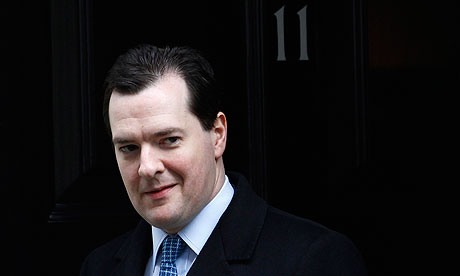
Chancellor says more progress has been made in last 24 hours than in previous 24 years in tackling tax secrecy and evasion
George Osborne told
the Today programme: 'We want to make sure that big international
companies, whose identities are well known, pay their fair share of
taxes where the profits are generated.' Photograph: Luke
Macgregor/Reuters
George Osborne claimed on Tuesday morning that the G8
summit had made more progress in ending tax secrecy and corporate tax
evasion in the past 24 hours than had been achieved in the previous 24
years. The chancellor said the goal was to make the international tax
system fit for the 21st century.
The existing system, created in the 1920s, has not been updated as the world has changed and the internet has arrived, he said.
The chancellor was speaking on Radio 4's Today programme before a final G8 session on international tax evasion that is likely to see broad agreement across a range of issues, including requiring companies to reveal their true owners to the tax authorities. The summit will also give a strong push to the OECD to set out a broader action plan on how to tax multinationals and ensure tax is paid in the country in which they make their profits.
Osborne said the international tax system had been constructed at the time of the League of Nations after the first world war and needed reform to take account of the digital age.
He said the UK was open to the idea of a public register of so-called beneficial owners, as opposed to a register open only to the UK tax authorities. Aid agencies have been pressing the UK to take a unilateral step to back public registers, but Cameron has argued that he would prefer to act in concert with other G8 countries. There is resistance to public registers from many G8 countries, including Canada.
Osborne told Today: "We want to make sure that big international companies, whose identities are well known, pay their fair share of taxes where the profits are generated, and individuals do not use the global financial system to hide their wealth and evade paying taxes where they should."
He went on: "The key thing is that the information is available to tax authorities so they can do their work, but there is a broader concern that we should try and make these registers public. In Britain we are going to consult on that and we would not consult on that unless we were very open to the idea."
The chancellor said there was a case for saying that many eyes should be able to look at who owns what. "The argument against making the registers public is that it might prove too burdensome for a company or what matters is that the information should be available to tax authorities."
Osborne emphasised the broad range of ideas being promoted at the G8, including the automatic exchange of information between tax authorities as well as action to clamp down on tax evasion by industries such as mining.
The existing system, created in the 1920s, has not been updated as the world has changed and the internet has arrived, he said.
The chancellor was speaking on Radio 4's Today programme before a final G8 session on international tax evasion that is likely to see broad agreement across a range of issues, including requiring companies to reveal their true owners to the tax authorities. The summit will also give a strong push to the OECD to set out a broader action plan on how to tax multinationals and ensure tax is paid in the country in which they make their profits.
Osborne said the international tax system had been constructed at the time of the League of Nations after the first world war and needed reform to take account of the digital age.
He said the UK was open to the idea of a public register of so-called beneficial owners, as opposed to a register open only to the UK tax authorities. Aid agencies have been pressing the UK to take a unilateral step to back public registers, but Cameron has argued that he would prefer to act in concert with other G8 countries. There is resistance to public registers from many G8 countries, including Canada.
Osborne told Today: "We want to make sure that big international companies, whose identities are well known, pay their fair share of taxes where the profits are generated, and individuals do not use the global financial system to hide their wealth and evade paying taxes where they should."
He went on: "The key thing is that the information is available to tax authorities so they can do their work, but there is a broader concern that we should try and make these registers public. In Britain we are going to consult on that and we would not consult on that unless we were very open to the idea."
The chancellor said there was a case for saying that many eyes should be able to look at who owns what. "The argument against making the registers public is that it might prove too burdensome for a company or what matters is that the information should be available to tax authorities."
Osborne emphasised the broad range of ideas being promoted at the G8, including the automatic exchange of information between tax authorities as well as action to clamp down on tax evasion by industries such as mining.
No comments:
Post a Comment
Thanks for your comment, keep reading our news and articles